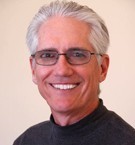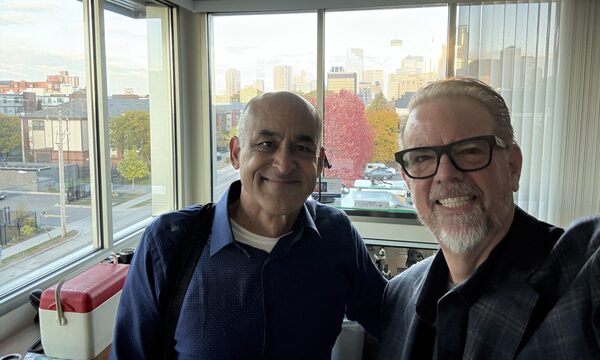Allow me to introduce you to Brett McCracken. Brett is a Talbot student and Biola employee whom God is using in some very strategic ways to represent Jesus and his people at the national level. I became acquainted with Brett through my oversight of the Good Book Blog. I am thankful and proud that this humble and gifted young man is part of the Biola/Talbot community, and I think that you will be, too, after you read the following interview.
Brett, tell us a bit about your background and what brought you to Biola?
I’m Midwestern born and raised (Tulsa, Oklahoma and Kansas City, Kansas) and went to Wheaton College (IL), so landing in Southern California certainly was not something I foresaw! But I have been out in California now for eight years--basically since graduating from Wheaton. I got a master’s degree in cinema and media studies at UCLA and then after that I got hired at Biola, where I have been since 2008.
Much of my journey over the last decade has involved journalistic pursuits such as freelance writing and editing for a variety of platforms. I started writing for Relevant and Christianity Today while an undergrad at Wheaton and since then I’ve written for a variety of publications, such as the Wall Street Journal, Washington Post, CNN.com, Huffington Post, Princeton Theological Review, Books & Culture and Q Ideas. I am currently a regular film critic for Christianity Today, a columnist for Converge Magazine and a contributor to MereOrthodoxy.com as well as my personal blog, The Search.
What is your current role at Biola and at Talbot?
My office is in University Communications and Marketing, and my duties include being managing editor for Biola Magazine, overseeing social media for the University, writing and editing for various marketing communications, assisting with Advancement and President’s Office communications, and working with various blogs and content channels such as Talbot’s Good Book Blog. I have also been heavily involved in the launch of the new Biola University Center for Christianity, Culture, and the Arts. I also teach as an adjunct in the journalism department.
In addition to working here at Biola, I’ve also been a part-time student at Talbot for the past four years, pursuing an M.A. in theology. I have been too busy the last year to take classes, but I’m hoping to resume my studies at Talbot this spring!
Biola has been an immense blessing in my life, more than I could ever have imagined when I arrived here five years ago. Among other things, I met my wife here! Kira (Williams, ‘07) McCracken works as Manager of Advancement Communications and we met in a Metzger hallway three years ago. We just got married in April and are so blessed to be able to serve this University together.
You’ve written a couple of books that have been well-received by the Christian community. Tell us about them.
My first book, Hipster Christianity was an attempt to explore the contemporary culture of “cool Christianity” (hipster churches, edgy pastors, Bible studies that meet in bars, tattooed youth pastors, etc.) and examine the larger question of the church’s “relevance” in today’s world. At its heart the book is a self-critique about the way evangelicals (myself included) have offered too-simple answers to the question of cultural engagement. The book addresses the pendulum swing of younger evangelicals away from the “culture is evil!” separatist approaches of prior generations, which was in some ways a healthy correction; it just went too far. Have we started embracing culture too much and for the wrong reasons?
My second book, Gray Matters is in many ways an answer to some of the questions raised by Hipster Christianity. Namely: how do we engage culture in between the extremes of "culture is bad!" legalism and "culture is amazing! Consume all of it!" libertinism (which is the extreme discussed at length in Hipster). If Hipster was mostly a description of a phenomenon and a bit of prescription (in general terms) of how we can get back on track, Gray Matters is the how-to guidebook for how to be a more thoughtful, healthy, God-honoring consumer of culture.
You new book, Gray Matters, is subtitled “Navigating the Space Between Legalism and Liberty.” How do you suggest we navigate that tricky terrain?
I think navigating the space between legalism and liberty begins with an acknowledgment of the extremes and a recognition that Christianity's relationship with culture is necessarily more complicated than many "black and white" approaches seem to suggest. Culture is not a monolith that is either all bad or all good. Culture is very much a gray area. The Bible gives many general principles on how Christians should relate to culture but not as many black and white "dos" and "don'ts" on the particularities of culture. Passages like Romans 14 emphasize the individual conscience in these matters: what's OK for one person may not be for another. Insofar as a cultural activity is not directly forbidden by Scripture or does not prove to be a stumbling block or stepping stone to sin, there is a lot of latitude and liberty given to Christians. But there are certainly limits. It's clear, for example, that one's community should be a factor in one's individual choices--even if it's "OK" for you to do something, should you do it if others in your community may struggle with it? It's also clear in Scripture that the lifestyles of Christians should be distinct and set apart from the surrounding culture. We are called to holiness. To be salt and light. What does this mean for us as we think about how to engage culture? The answers are not simple or easy, but that's the point. The more we think about them and discuss them--not shrugging them off as "subjective" and leaving it at that--the more we will begin to formulate a more robust theology of culture that will bless us individually, advance the witness/mission of the church, and bring glory to God.
You were recently mentioned in an article in Salon, along with Tim Tebow and three others, as one of five key people trying to give some credibility to Christianity among young people in America today. How is it that you have found yourself on the radar of public media like this?
I was the most surprised of anyone to see myself on that list, in the company of Tim Tebow of all people! It was a weird article but I guess I should be encouraged that my work is causing people to talk and react.
I think my books--particularly Hipster Christianity--have helped get my name out there, even among national secular media. When Hipster came out in 2010, I think it was an eye-catching and provocative idea that caught the attention of journalists. It was covered by all sorts of outlets, including the New Yorker, the Washington Post, and Details.
I’ve written some op-eds in national media that have been widely circulated as well--particularly a piece for the Wall Street Journal on “wannabe cool Christianity” and one in the Washington Post on keeping Millennials in church. Articles like these, that get my voice outside the bubble of Christian media, have been great opportunities to introduce my ideas and writing to wider audiences.
What are the motivations that drive your writing?
I would say there are two levels of motivation behind my writing--one rather broad and one more specific. The first is the broad goal of simply publishing writing that is smart and excellent, that engages ideas from a Christian perspective in a way that is both insightful and readable. I would love to be a writer who follows after C.S. Lewis in the sense of combining depth, logic and passion with witty, popular-level prose. I feel like there are not enough Christian writers and journalists out there who are bridging the gap between academic rigor and popular level discourse, making sometimes difficult concepts and weighty issues logical and compelling for wide audiences.
A more specific goal would be to write things that challenge Christians to think more critically and adopt a more nuanced posture in their relationship with culture. I think I occupy a unique space as a young, culturally literate evangelical who is theologically conservative and committed to Christian orthodoxy, yet willing to push boundaries in some areas. Part of why I get attacked in places like Salon is because I don’t fit into the tidy categories and boxes that our culture has created for Christians. The Salon piece couldn’t handle the fact that I was a passionate Arcade Fire fan and tweeted about Breaking Bad, but also opposed legalizing gay marriage. I think that in general it’s healthy for Christians to complicate the categories that have been defined for us (and which we have often perpetuated), not for the sake of being elusive or hard-to-define, but because thinking critically and passionately in pursuit of Christ necessitates it.
 Biola University
Biola University



.jpg)